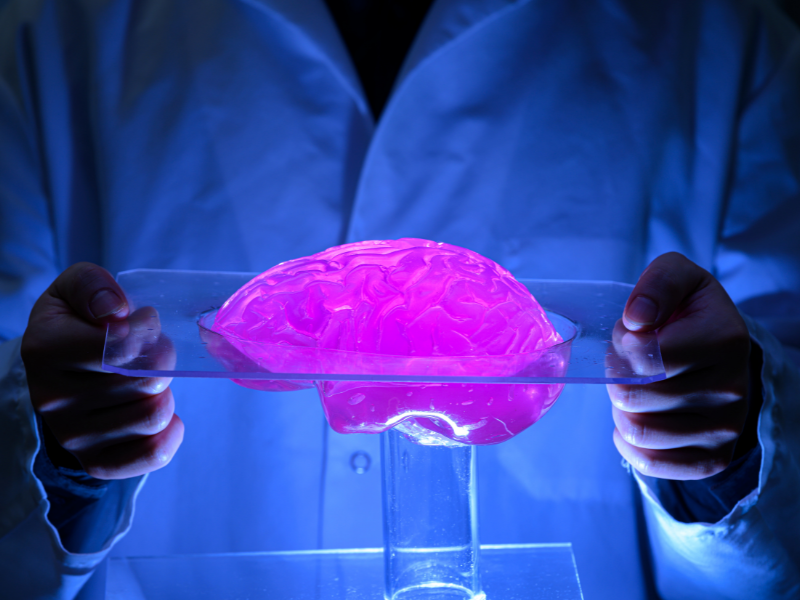Villanova Engineering Professor Awarded Second Patent for Groundbreaking ‘Smart Brain’

Qianhong Wu, PhD, has been awarded a second patent for his innovative biomimetic model of the brain and skull.
VILLANOVA, Pa. (June 14, 2023) — Villanova University Professor of Mechanical Engineering and Director of the Cellular Biomechanics and Sports Science Laboratory, Qianhong Wu, PhD, has been awarded a second patent for his innovative biomimetic model of the brain and skull. Mimicking the human head, Dr. Wu’s ‘smart brain’ enables researchers to measure the motion and deformation of brain matter during impact-induced brain trauma, providing not only a better understanding of brain injuries, including concussions, but also guidance for preventing such injuries.
“Traumatic brain injuries are a significant health issue, as well as an economic burden on society,” says Wu, who has devoted his career to biomedical engineering and biometrics, including brain injury. “Our smart brain provides insight into what specifically happens to the brain when a person endures a head injury. It fills a significant knowledge gap in the study of traumatic brain injuries and has the potential to guide the creation of improved head protection, reduce the incidence of concussions and save lives.”
The first-of-its-kind smart brain model consists of a transparent skull, simulant brain matter, supporting structure and watery cerebrospinal fluid, the fluid surrounding the brain and separating it from the skull. Full instrumentation, including high-speed cameras, pressure sensors, accelerometers and displacement sensors can track and capture the flow and pressurization of cerebrospinal fluid during simulation of the brain hitting a sudden external impact—concrete, the ground, metal, a bat, a vehicle, or another person’s head—a key component to understanding concussions, according to Wu. Using anatomical data gathered from an individual, the model can be customizable to a specific patient, and the simulated head injuries can be measured to show the impact of a one-time injury, as well as the damage from repeated head trauma.
Wu’s novel smart brain focuses on an area that other researchers have not looked at—the movement of brain matter inside the skull and how that impacts brain injuries. His first patent, awarded in 2019, covered the smart brain concept, while this latest patent is for the full construction of the model and technology to measure cerebrospinal fluid motion. Designed with PhD student Ji Lang, this multi-disciplinary project integrates computational, theoretical and experimental approaches and involves the fields of fluid mechanics, materials science and manufacturing.
“Dr. Wu works tirelessly to continue to perfect the smart brain,” says Amanda Grannas, PhD, Vice Provost, Chief Research Officer and professor of Chemistry. “We congratulate him on this momentous achievement and look forward to seeing how the smart brain makes a positive impact on the lives of many.”
Whether it be from a single injury in sports, a military event, construction/industrial work, an elder experiencing a fall, or from repeated head trauma, concussion and sub-concussive head trauma can cause headaches, nausea, dizziness, sensitivity to light, blurred vision, slurred speech, ringing in ears, loss of consciousness, confusion, memory loss, as well as permanent mood changes, personality and behavioral changes and problems with motor skills and function. Wu’s smart brain technology will have broad impact on both brain biomechanics and the next generation of helmet design, not only for athletes but also for soldiers, construction workers, and others at risk with their day-to-day activities.
“The problem itself is very complex and challenging, and our work is the first to attempt to uncover a long-standing mystery in brain biomechanics based on critical physical insights and using highly innovative approaches,” says Wu. “We hope to fill in a significant knowledge gap in the study of traumatic brain injuries.”
Wu was also recently awarded a National Science Foundation (NSF) grant to further his research in the area of cerebrospinal fluid and its impact on traumatic brain injuries. Titled, “EAGER: Transient Cerebrospinal (CSF) Flow in Brain Concussion,” Wu will study the movement of cerebrospinal fluid within the brain as it is exposed to sudden and rapid external impacts, and then measure the impact the fluid has during brain concussion. The project has the potential to guide the creation of effective head protection, reduce the incidence of concussion, lead to significant cost savings and benefit society by saving lives.
For additional information and to learn more about the smart brain, please visit our website.
About Villanova University: Since 1842, Villanova University’s Augustinian Catholic intellectual tradition has been the cornerstone of an academic community in which students learn to think critically, act compassionately and succeed while serving others. There are more than 10,000 undergraduate, graduate and law students in the University's six colleges—the College of Liberal Arts and Sciences, the Villanova School of Business, the College of Engineering, the M. Louise Fitzpatrick College of Nursing, the College of Professional Studies and the Villanova University Charles Widger School of Law. Ranked among the nation’s top universities, Villanova supports its students’ intellectual growth and prepares them to become ethical leaders who create positive change everywhere life takes them. For more, visit www.villanova.edu.

